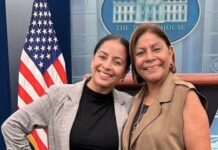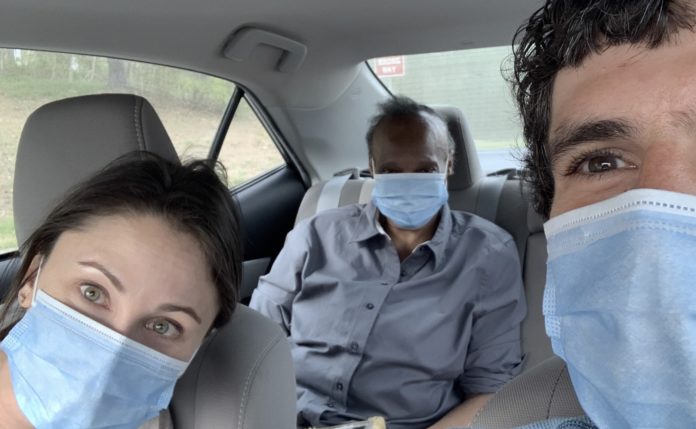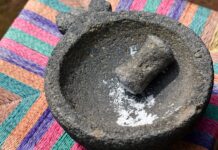NO PURCHASE NECESSARY. PURCHASES DO NOT INCREASE ODDS OF WINNING. ODDS OF WINNING DEPEND ON NUMBER OF ELIGIBLE ENTRIES RECEIVED. VOID WHERE PROHIBITED.
1. Promotion and Sponsor. Participation in the Chispa & BELatina’s Date & Educate Sweepstakes promotion (the “Promotion”) constitutes Entrant’s (as defined below) full and unconditional agreement to these Official Rules. Entrant is free to disclaim any prize and status as Entrant, and as a result will not be eligible to receive any prize. The Promotion is sponsored by Affinity Apps, LLC, 8750 North Central Expressway, Suite 1400, Dallas, Texas 75231, United States (“Sponsor”), and administered by BELatina 3860 N Powerline Rd, Pompano Beach, FL 33073, United States (“Administrator”). All decisions related to, as well as all interpretation of, these Official Rules by Sponsor and Administrator are final and binding. While this Promotion may be promoted via social media websites, such websites are not affiliated with Sponsor, Administrator, or this Promotion. This Promotion is in no way sponsored, endorsed, or administered by, or associated with Facebook, Twitter, Instagram, Snapchat, TikTok or any other third-party website or application that might host content where information about this Promotion is published (collectively “Content Hosts”). Entrant is providing information only to Sponsor and Administrator, and not to Content Hosts.
2. Promotion Period. The Promotion begins at 12:01 a.m. CST on July 18th 2022 and ends at 11:59 p.m. CST on August 16th, 2022 (the “Promotion Period”). Only entries submitted and received during the Promotion Period will be accepted. Sponsor is the official timekeeper of this promotion.
3. Eligibility. The Promotion is open only to individuals that are legal residents of one of the fifty United States & Puerto Rico, age 18 or older, who at the time of entry have a valid and active account on the free Chispa dating application and registered for Fall Semester of College. Employees or agents of Sponsor, Administrator or their respective parent or affiliate companies, vendors, suppliers, consultants, sub-contractors, distributors, legal counsel or advertising, marketing, public relations, or promotional/fulfillment agencies, as well as the immediate family (spouse, parents, siblings, and children) and household members of each such employee or agent, are not eligible. Legal entities are not eligible to enter. Eligibility is contingent upon agreement to, compliance with, and fulfillment of all requirements of these Official Rules.
4. How to Enter. NO PURCHASE NECESSARY. PURCHASES DO NOT INCREASE ODDS OF WINNING. There is one method of entry. By participating in the Promotion in any way you will become an “Entrant.” Each Entrant who enters using the below method of entry will receive one entry in the Promotion. Limit one eligible entry per person and per Chispa account.
Chispa Entry: During the Promotion Period, you will automatically become an Entrant and receive one entry in the Promotion by logging into your Chispa dating application, locating the Promotion advertisement featuring Chispa & BELatina’s Date & Educate, clicking on the advertisement and completing and submitting the resulting entry form with your name, address, and email.
5. Conditions of Entry. Entries not legitimately submitted in accordance with these Official Rules are void. Only qualified entries received by Sponsor during the Promotion Period are eligible for participation.
Entrants may be required to provide the following information to be eligible for a Promotion prize: first, middle and last name, month, day and year of birth, email address, complete mailing address, and All phone number (collectively or individually, “Personal Information”). requested Personal Information must be provided to participate in the Promotion and to be eligible to win a prize. Unintelligible entries; entries with incomplete, invalid, incorrect, or noncurrent information; and entries that are counterfeit, damaged or tampered with in any way will be disqualified. Entries that are late, lost, damaged, misdirected, stolen, or not delivered are not the responsibility of Sponsor and will be disqualified. Sponsor is not responsible if a potential winner does not receive a prize because erroneous, expired, canceled, fraudulent or fake information was provided during the Promotion. Proof of sent entry or entry receipt (such as a copy of a “thank you” message) does not constitute proof of actual receipt of entry by Sponsor for purposes of this Promotion.
Participation must be by Entrant. Participation by any other individual or entity, or originating at any other website or application, including without limitation, commercial promotion entering and subscription notification service sites, is invalid and will be disqualified from this Promotion. Any attempt by any Entrant to obtain more than the stated number of entries by using multiple email addresses, phone numbers, identities, registrations, or logins; entries through a sweepstakes club or similar entity; or any other unauthorized method of entry will void all of Entrant’s entries and Entrant will be disqualified from the entire Promotion. Submitting mass entries or entries generated by an automated program, script or macro, or the use of any other similar device, program, or method to enter this Promotion, is prohibited and will result in disqualification.
In the event of a dispute as to the identity of Entrant, the authorized account holder of the email address entered on the Promotion entry form will be deemed to be Entrant. A potential winner may be required to show proof of being the authorized account holder. The “authorized account holder” of an email address is the natural person assigned to that email address by any organization (business, educational institution, etc.) responsible for assigning accounts to that email address. If the identity of the individual who actually participated in the Promotion cannot be resolved to Sponsor’s satisfaction, the affected individual’s entry will be deemed ineligible.
Sponsor may, in its sole discretion, disqualify any individual it finds to be in violation of these Official Rules, tampering with the entry process or the operation of the Promotion (including without limitation, tampering with websites, email addresses or phone numbers), or acting in a non-sportsmanlike or disruptive manner. Any attempt to undermine the operation of the Promotion may be a violation of criminal or civil law, and Sponsor may seek damages to the fullest extent permitted by law from any person it finds to have made such an attempt.
6. Prize. There is one prize available to be won by three entrants. Approximate retail value (“ARV”) of each prize is a five-hundred United States dollars (USD $500.00). The prize consists of a $500 gift card for student to buy textbook for fall term 2022.
All additional costs, including without limitation, web or data charges, taxes and other personal charges not specifically described as part of the prize above are not included in the prize. No compensation or substitution will be provided for any difference in prize value. Sponsor and Administrator are in no way responsible for any cancellations, delays, postponements, diversions, substitutions, changes in service or accommodations, or any other act, omission, or result thereof, caused by any third party. All prizes must be accepted as awarded without substitution and are not, in whole or in part, assignable, transferable, or available for resale. Prizes have no cash surrender value, except where required by law. Sponsor and Administrator have made no warranty, representation, or guarantee, express or implied, in fact or in law, with respect to any prize. This includes, without limitation, any warranty, representation, or guarantee related to any prize’s quality or fitness for a particular purpose. The prize is subject to availability and Sponsor may substitute a prize (or a component thereof) with another prize of equal or greater value if the prize is not available for any reason, as determined in Sponsor’s sole discretion. Other prize substitution options are available where required by law. Federal, state, and local taxes and all other costs and expenses associated with acceptance and use of any prize not specified herein as being awarded are the winner’s sole responsibility. Prize specific terms and conditions apply. If the winner elects not to partake in any portion of the prize, any remainder of the prize that is unused will be forfeited and will not be subject to further or additional compensation. The winner is responsible for obtaining proper technology (including a video conferencing application, if desired) prior to participating in the prize.
If any potential winner is disqualified, not eligible, or for any other reason cannot accept the prize as stated, then Sponsor may randomly select a new potential winner from the remaining pool of eligible Entrants. Where legal, the winner may be required to submit, without alteration and in the form provided by Sponsor or Administrator, a completed and signed Affidavit of Eligibility and Liability & Publicity Release (the “Release”), along with a properly completed U.S. Department of the Treasury Internal Revenue Service Form W-9 or equivalent, within the required time period communicated in the Release to be eligible to receive or participate in any prize. The winner may be issued a U.S. Department of the Treasury Internal Revenue Service Form 1099 and related tax forms for the actual value of the prize provided by Sponsor or Administrator.
Only the number of each prize set forth in these Official Rules will be awarded. In the event that any error, mistake, failure or discrepancy causes more than the stated number of prizes as set forth in these Official Rules to be promoted, noticed or claimed, Sponsor may award only the stated number of prizes by conducting a random drawing from among all legitimate, unawarded, eligible prize claims.
7. Winner Determination and Verification. The process leading to the selection of a potential prize winner is within the sole discretion of Sponsor. Within 30 days after the end of the Promotion Period, three potential winners will be randomly drawn from the pool of all eligible entries received during the Promotion Period.
Potential winners are each subject to eligibility verification, on an ongoing basis, by Sponsor or Administrator, whose decisions are final and binding. An Entrant is not a winner of any prize, even if notified of being a winner or issued any item of value, unless and until Entrant’s eligibility has been, and continues to be verified to the satisfaction of Sponsor.
To be verified as eligible to receive a prize, each potential winner must fulfill all requirements and continue to comply with all terms and conditions of these Official Rules, and not be disqualified for any reason. Each potential winner will be notified by email or phone (subject to Sponsor’s and Administrator’s discretion). If a potential winner of any prize cannot be contacted using the information provided, or fails to respond to Sponsor’s or Administrator’s attempt to notify them of selection within three business days; if any prize or notification is returned as undeliverable or yields an error or undeliverable type “bounce back” message (regardless if the message is ultimately delivered to the recipient); if the potential winner fails to sign and return the Release or any other required documentation or fails to comply with these Official Rules; if a potential winner is unable or unwilling to accept the prize (or any portion) as stated; or if the potential winner cannot be verified as eligible for any reason at any time before, during or after the Promotion Period, the potential winner is disqualified and forfeits the prize (or relevant portion, subject to Sponsor’s discretion), and an alternate potential winner will be randomly selected from among the remaining eligible entries.
In the event that an Entrant or potential winner is disqualified or fails to claim a prize for any reason, the foregoing process will be repeated until all prizes are awarded, or until three attempts have been made to award each prize and each attempt has failed. EXCEPT AS REQUIRED BY LAW, IF ANY PRIZE REMAINS UNAWARDED FOR ANY REASON AFTER THREE ATTEMPTS, THAT PRIZE WILL NOT BE AWARDED IN THIS PROMOTION.
Potential winners will be required to submit student ID or proof of Fall 2022 semester registration. Winners agree to be featured in BElatina’s Social Media platforms either by Name, Name & picture or Name & Video from winner stating they are a winner of the sweeps.
Odds of winning the prize depend on the number of eligible entries received.
8. Limitations of Liability. By entering or participating in this Promotion or any prize in any way, each Entrant agrees to indemnify, defend (regardless of ultimate liability), and hold harmless, and thereby does release and discharge Sponsor, Administrator and Content Hosts, and each of their respective parent and affiliate companies, vendors, suppliers, consultants, sub-contractors, distributors, legal counsel and advertising, marketing, public relations and promotional/fulfillment agencies, and each of their respective parent companies and each such company’s officers, directors, employees and agents, as well as the immediate family (spouse, parents, siblings and children) and household members of each such individual (collectively, the “Released Parties”) from and against any loss, damage, injury, claim or cause of action related in any way whatsoever to this Promotion, these Official Rules, or the rights, consents and licenses granted to Sponsor or Administrator under these Official Rules, including without limitation, infringement of any right of publicity or intellectual property; threatened or actual injury, loss or damage to any person, including death and disability; defamation or portrayal in a false light (intentional and unintentional); invasion of privacy; and damage to or loss of property, arising out of such Entrant’s participation in the Promotion or participation in, receipt or use, non-use or misuse of any prize. To the maximum extent allowed by law, in no event will Released Parties be responsible or liable for any damages or losses of any kind, including indirect, incidental, consequential or punitive damages arising out of this Promotion. (Some jurisdictions may not allow the limitations or exclusion of liability for incidental or consequential damages or exclusion of implied warranties. Check local laws for restrictions regarding these limitations or exclusions.)Entrants waive any right to claim ambiguity in these Official Rules. The Released Parties are not responsible for: (1) technical failures of any kind; (2) incorrect or inaccurate information, whether caused by Entrants, any internet or email service provider, any promotional or advertising agency, printing or computing errors, or by any of the equipment or programming associated with or utilized in the Promotion; (3) unauthorized human intervention in any part of the entry process or the Promotion; (4) technical or human error that may occur in the administration of the Promotion, the processing of entries or the announcement of the winner or prize; (5) any injury or damage to persons or property, including without limitation computers, phones and tablets, that may be caused, directly or indirectly, in whole or in part, by Entrant’s participation in the Promotion or access to the Promotion materials; (6) the participation in, receipt, use or misuse of any Promotion prize; or (7) any other errors in any materials, information or announcements associated with the Promotion. If for any reason an Entrant’s entry is confirmed by Sponsor and Administrator to have been erroneously deleted, lost or otherwise destroyed or corrupted by Sponsor or Administrator, Entrant’s sole remedy is another entry in the Promotion, subject to availability and provided that the Promotion Period has not then expired.EACH ENTRANT WAIVES CALIFORNIA CIVIL CODE § 1542 (AND ALL SIMILAR LAWS OF ANY STATE OR TERRITORY OF THE UNITED STATES), WHICH READS: “A GENERAL RELEASE DOES NOT EXTEND TO CLAIMS WHICH THE CREDITOR DOES NOT KNOW OR SUSPECT TO EXIST IN HIS FAVOR AT THE TIME OF EXECUTING THE RELEASE, WHICH IF KNOWN BY HIM MUST HAVE MATERIALLY AFFECTED HIS SETTLEMENT WITH THE DEBTOR.” EACH ENTRANT REPRESENTS AND WARRANTS FULL UNDERSTANDING OF, AND ACKNOWLEDGES THE SIGNIFICANCE AND CONSEQUENCE OF, WAIVER OF CALIFORNIA CIVIL CODE § 1542 (AND ALL SIMILAR LAWS OF ANY STATE OR TERRITORY OF THE UNITED STATES).
9. LICENSE FROM ENTRANT. To the extent allowed by law, participation in the Promotion in any way or acceptance of, or participation in, any prize constitutes each Entrant’s consent for, and grant of a non-exclusive, sub-licensable and assignable license to Sponsor to use, publish, post and display Entrant’s name, social media handles, likeness, photograph, voice, statements and hometown, regardless of whether altered, distorted, or used alone or with other material, in Sponsor’s sole discretion, for promotional, advertising, trade and publicity purposes in any medium now known or later discovered, worldwide and in perpetuity, without review or approval, and without further notice, payment or consideration of any kind.
All rights, consents and licenses granted to Sponsor and Administrator under these Official Rules or the Release will survive the termination of this Promotion. Such consents and licenses may only be revoked in writing, and the mere ending of this Promotion is not sufficient to revoke such consents or licenses.
10. Right to Modify or Cancel. The invalidity or unenforceability of any provision of these Official Rules will not affect the validity or enforceability of any other provision. In the event any provision is found invalid or unenforceable, these Official Rules will otherwise remain in effect in accordance with their terms as if the invalid or unenforceable provision was never included. Sponsor’s or Administrator’s failure to enforce any provision of these Official Rules does not constitute a waiver of that provision.
Sponsor may cancel, suspend or modify the Promotion or any part of it, in any way, if Sponsor determines in its sole discretion that the Promotion is not capable of executing as Sponsor intended, or that any error, omission, fraud, technical failure, tampering, computer virus or other factor, technical or otherwise, beyond Sponsor’s reasonable control, impairs or may impair Sponsor’s or Administrator’s ability to properly conduct the Promotion, subject to any applicable law or regulation. In such event, Sponsor may, but is not obligated to, award any applicable prize by conducting a random drawing from among the eligible entries received up to the time of the cancellation, suspension, or modification of the Promotion. Inclusion in such random drawing is Entrant’s exclusive remedy under such circumstances.
In the event of an inconsistency between these Official Rules and any disclosure or other statement contained in any Promotion-related materials, including without limitation, a Promotion entry form or any point-of-sale, radio, television, print or online advertising, these Official Rules will prevail and govern.
11. Disputes; CLASS ACTION WAIVER. Except where prohibited by law, Entrant agrees that: (1) all disputes, claims and causes of action arising out of or connected with this Promotion or any prize awarded will be resolved individually, without resort to any form of class action, and Entrant consents to the personal jurisdiction of the appropriate federal or state court located in Dallas County, Texas, United States for such purpose; and (2) all claims, judgments and awards will be limited to actual out-of-pocket costs incurred, including costs associated with entering this Promotion, but in no event attorneys’ fees. All issues and questions concerning the construction, validity, interpretation and enforceability of these Official Rules, or the rights or obligations of Entrant, Sponsor or Administrator in connection with the Promotion, are governed by and construed in accordance with the laws of the State of Texas, United States, without giving effect to any choice of law or conflict of law rules that would cause the application of the laws of any other jurisdiction.
12. Privacy. By entering this Promotion, Entrant agrees to Sponsor’s and Administrator’s manner of collection, use, retention, and disclosure of Entrant’s Personal Information submitted in connection with the Promotion. Personal Information collected from Entrant is subject to Sponsor’s privacy policy, which can be found at chispa-app.com/privacy-policy and may additionally be disclosed by Sponsor or Administrator in connection with a public list of Promotion winners, or pursuant to any license granted to Sponsor or Administrator by Entrant under these Official Rules or the Release.




































